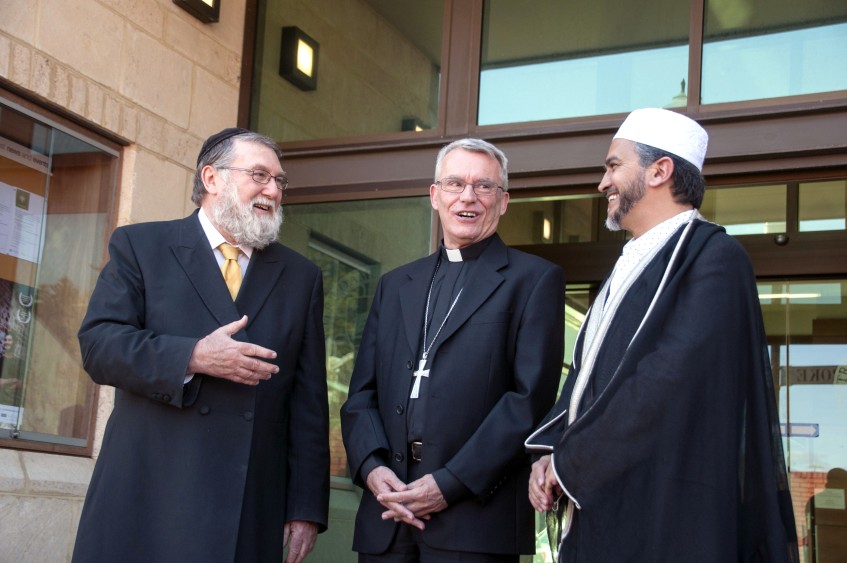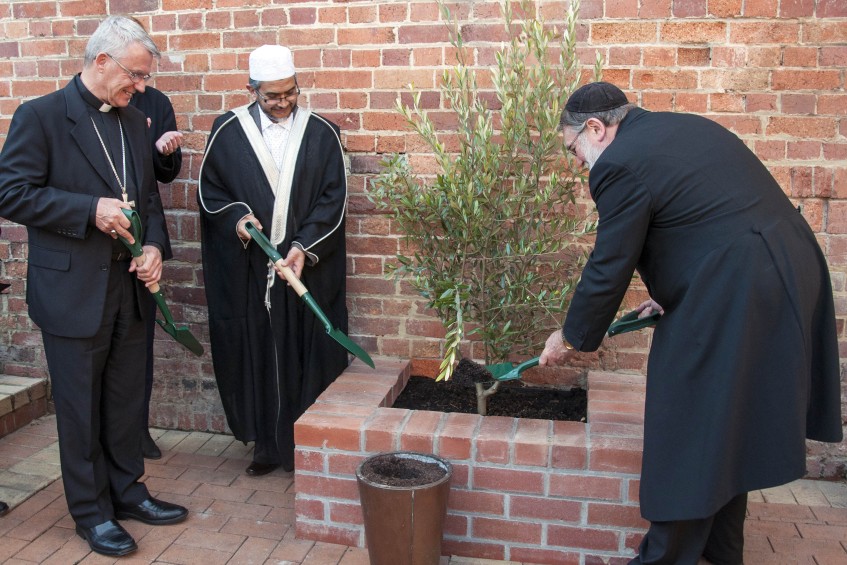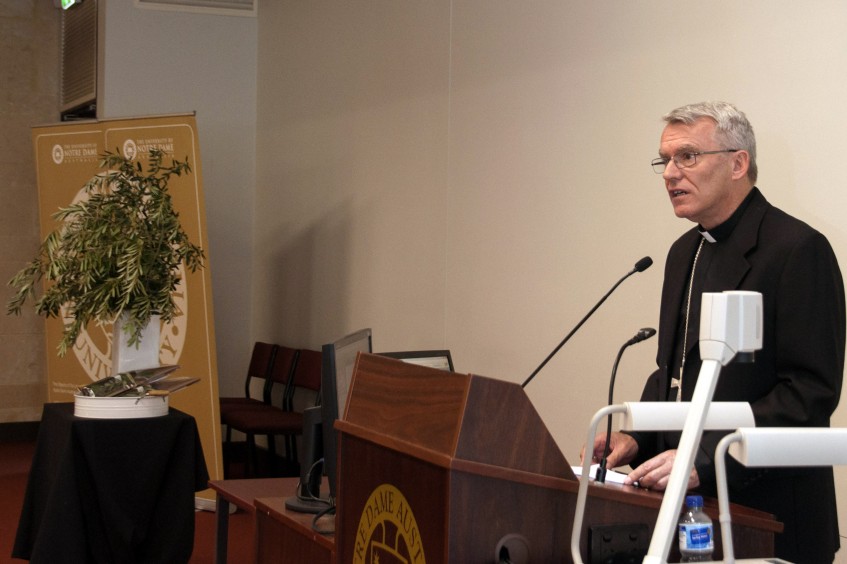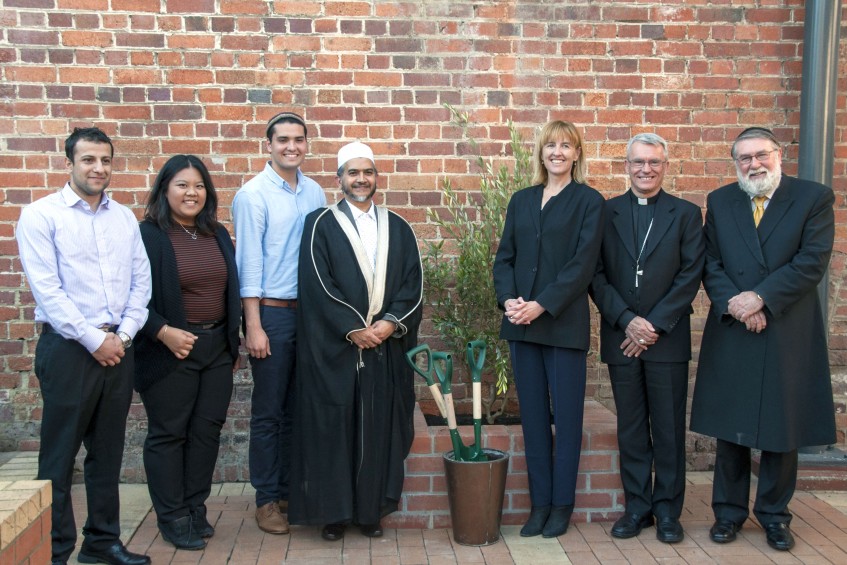Abraham Day brings three monotheistic faiths together in spirit of fraternity and communion

Perth Archbishop Timothy Costelloe SBD, Chief Rabbi of Western Australia, Dovid Freilich OAM, and Imam at Langford Islamic College, Sheikh Muhammad Agherdien, gathered at Notre Dame University’s Fremantle Campus on 13 September for an interfaith gathering titled Abraham Day. Photo: Marco Ceccarelli
By Marco Ceccarelli
“A celebration of what we have in common: first and foremost the belief in God, the one God, the God of Abraham.”
With these words, The University of Notre Dame Australia Vice-Chancellor, Professor Celia Hammond, opened Abraham Day – an interfaith event that brought together the three Abrahamic faiths – Christianity, Judaism and Islam – in a spirit of openness, fraternity and communion.
Held at Notre Dame’s Fremantle Campus on 13 September, the interfaith gathering saw Perth Archbishop Timothy Costelloe SBD, Chief Rabbi of Western Australia, Dovid Freilich OAM, and Imam at Langford Islamic College, Sheikh Muhammad Agherdien, reflect on the theme of ‘Abraham: Our Father in Faith’.
The three representatives discussed the significance of Abraham for their own religious tradition before collectively planting an olive tree, a symbol of peace, in the university’s Malloy Courtyard.

The leaders of the three Abrahamic faiths, Christianity, Judaism and Islam, planted an olive tree, a symbol of peace, in Notre Dame University’s Malloy Courtyard. Photo: Marco Ceccarelli
The first to speak of Christians, Muslims and Jews as “children of the merciful, steadfast, compassionate and forgiving God,” was Archbishop Costelloe.
In a talk which, to a large extent, focused on the dimension of “mercy” as a binding element shared by all three religions, Archbishop Costelloe called on members of each tradition to see each other as brothers and sisters and to learn more about the other’s religion.
He also stressed that this does not mean naively ignoring the many differences that exist between the three religious traditions. On the contrary, the Archbishop emphasised that in order to enter into respectful, informed and human dialogue, one has the duty of deeply knowing and holding steadfast to his or her own religious tradition.
“As much as we can, we must seek to know and understand, albeit from the outside, the other traditions, coming in this way to understand better why we see things differently but also why those differences do not negate the fundamental things we share in common,” he said.
Dwelling on the notion of God’s mercy, Archbishop Costelloe drew a comparison between three aspects of each religion: Psalm 86 in the Torah, which speaks of God as merciful and gracious; the labelling of God in Islam as the all-merciful and all-compassionate and the figure of Jesus Christ as the embodiment of God’s mercy.
He then spoke of the unifying force of this shared understanding of the “one God” and of its potential to reflect divine mercy in our world.

Archbishop Timothy Costelloe spoke of Christians, Muslims and Jews as children of the merciful, steadfast, compassionate and forgiving God. Photo: Marco Ceccarelli
The Archbishop concluded by speaking of God’s call of Abraham as “a key moment in God’s involvement in the world and in human history”, which the three faiths also hold in common.
The very uniqueness of Abraham, which contributed to him receiving this label of ‘father of Abrahamic faiths’, was the question raised by Rabbi Freilich in his talk.
Rabbi Freilich explained that while Abraham was not the first one to believe in one God since Adam communicated with the one God, as did Noah, he was the first one to have a way of life and value system based on the belief in one God. Rabbi Freilich stated that Abraham’s experience of God was such that he could be directed in a sense of righteousness and justice, highlighting Abraham’s determination to not be influenced by the trends of a society that practiced idolatry but “be an example of living with godliness.”
The love and tenderness which Abraham showed Ishmael – Abraham’s first son, born from his handmaiden Hagar – was also emphasised by Rabbi Freilich.
“Abraham prays for Ishmael and refuses to neglect him. Although Ishmael according to Jewish people was not the spiritual heir of Abraham, he is to Islam, Abraham prays for him and gives him great love and this love is encouraged by God,” he said.
“The way of love shown by God to Abraham is to show love even to those who do not follow the same spiritual direction as ourselves.”
After framing the event of God sparing Isaac’s life as not so much as an act of obedience, but one highlighting the sanctity of human life in that God himself instructs Abraham not to take the life of his child on the altar of religious belief, Rabbi Freilich concluded by stating that the way to do righteousness, as shown by Abraham, is to live godly lives, to show love to those who may not follow our spiritual paths and to recognise the sanctity of life.

(from left to right) Notre Dame Muslim, Christian and Jewish students Mohamed Al-Hassany, Jodilee Tangarorang and Aharon Freidland pictured with Sheikh Muhammad Agherdien, Professor Celia Hammond, Archbishop Timothy Costelloe and Chief Rabbi Dovid Freilich at Abraham Day. Photo: Marco Ceccarelli
Almost as if to pick up from where Rabbi Freilich had left off, Sheikh Agherdien spoke of Abraham as a virtuous man with a strong ethos of faith and a God-given consciousness and discernment of what was right.
Much like Archbishop Costelloe, Sheikh Agherdien also mentioned the various differences between the three monotheistic religions, yet he went on to stress that these should not distract their members from focusing on shared common ground.
“Our three traditions are confluents of doctrines, revelations, parables and mythologies flowing together from a single source. The divergence from the stream should not serve as an impediment to our esoteric religious experiences but rather as a means of enhancing one another’s validity of the sacred and shared ancestry,” the Sheikh said.
With particular reference to modern day challenges in the world which require the urgent intervention of peace-seeking Christians, Muslims and Jews, Sheikh Agherdien invited all those present to look to revealed scriptures and to the figure of Abraham for guidance.
“Descendants of our father in faith Abraham, let us return to our ancient wisdom in the midst of our collective modern day challenges. The truth of monotheism which we all share in our common heritage certainly has the answers and they are unblemished by time or age,” he said.
“We just have to look upward and reflect deep within, we just have to look in the right direction, the direction of our revealed scriptures and the pre-eminent and unsurpassed example of the life of Abraham, peace be upon him.”
The event concluded with a public prayer gathering – a fitting gesture that echoes the recent 30th World Day of Prayer for Peace in Assisi, attended by Pope Francis and numerous leaders of global religions.
